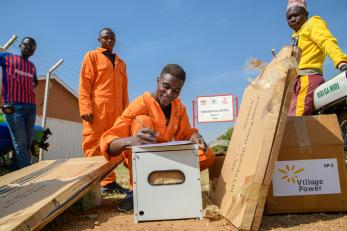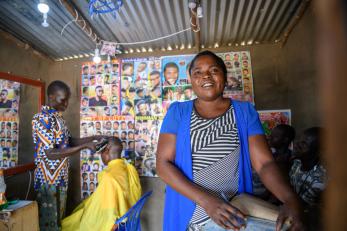Closing the energy access gap: de-risking private sector entry into Bidibidi refugee settlement

We all need access to energy - at home, at work and in the community. It allows us to earn an income, connect with the world, and provides a healthy and comfortable living environment.
From our experiences, we know that bridging the energy access gap is essential to improving livelihoods; it’s an enabler that underpins and supports all humanitarian and development sectors and clusters. Improved access to energy can transform lives and entire communities, yet it’s often overlooked and underfunded in humanitarian response.
To address this challenge, Mercy Corps’ Energy team, along with 12 other Dutch organisations, have joined DCHI and RVO’s Access to Modern Energy Accelerator Programme to consider the most pressing energy challenges facing communities, and how we might collaborate to solve these.
What we know - lessons from Uganda

Simon lives in Bidibidi refugee settlement in Uganda, and like everyone she needs energy for a range of activities. However, her access to clean, affordable and reliable energy is restricted, as private sector distributors of certified energy products are often hesitant to work in markets that are perceived to be risky.
With limited investment in the market, the energy products that are available are often very expensive, of low quality or without post-sales services, which can undermine consumer trust. However, we know this scenario can change.
Our past programming has shown that co-ordinated action between multiple actors can create long lasting sustainable solutions in displacement settings. By facilitating the introduction of private sector energy providers into Bidibidi the gap between demand and supply of quality, affordable energy services and equipment can begin to close.
With increased access to a range of products, consumers like Simon have greater choice and can purchase goods to suit their specific priorities. In this case, Simon chose to buy electric equipment for a barber shop whilst also offering a mobile phone charging service to earn additional income.
Simon is not unique in this situation. With approximately 232,726 people living in Bidibidi, and 24.5% reporting a formal occupation, there is huge potential for creating a well-functioning clean energy market to close the energy access gap for refugees. Our previous research suggests that vulnerable households earning an income can afford entry level products ($8-20 USD) using either cash or financing support from Village Savings and Loans Associations, and that farmers and business owners can afford $20-200 for products through pay-as-you-go mechanisms or alternative financing support.
From experiences like this we have learned valuable lessons on what’s needed to close the energy access gap, and these lessons have guided our call to action that we have developed as part of the Access to Modern Energy Accelerator Programme.
Call for collaboration
We are looking for partners who will help us create sustainable and functioning energy markets for refugees and host community members, also by exploring the best ways to stimulate and de-risk private sector entry into Bidibidi refugee settlement, whilst guaranteeing inclusive interventions that can be accessed by all consumer segments.
We would love to hear from a range of organisations including NGOs, impact investors, foundations, corporates, private sector distributors or anyone with experience in innovative financing or de-risking mechanisms to co-create a solution.
Why collaborate with us?
Mercy Corps’ Energy Access portfolio spans over 15 countries, providing clean, affordable and reliable access to energy to the world's most vulnerable communities Projects range from last-mile distribution of certified solar and clean cooking products, to energy efficiency, rural electrification, and grid scale productive power projects.
Our Energy team looks beyond traditional humanitarian approaches like in-kind distributions, which are failing to satisfy needs given the scale of this challenge. Therefore, our approach to energy access is rooted in innovative, market-based programming that supports resilient livelihoods. We apply our expertise in harnessing the power of market systems and good governance to test solutions in multiple contexts, using energy as a catalyst for change and as an entry point for community engagement, governance, institution building, food security, and job creation.
Mercy Corps is uniquely positioned to play a facilitation and bridging role in these contexts given our vast programme platforms, our deep understanding of governance in the countries where we work, and the trusted networks we have built in off-grid communities around the world. Some examples of our work: BRESHNA, AMPERE, Resilience Hubs and EEMRG.
Please reach out to Megan Lancaster (mlancaster@mercycorps.org) by 27th November if you are interested in collaborating with us.